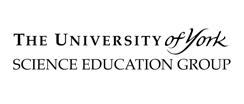- View more resources from this publisher
 University of York Science Education Group (UYSEG)
University of York Science Education Group (UYSEG)
Extension Modules for GCSE Chemistry
The Salters' GCSE chemistry course (1993 – 2007) was based on the chemistry content from the double award science course, with the addition of three new modules to provide coverage of the extra content.
Energy and Chemical Change: Energy changes which accompany chemical reactions. Photosynthesis is considered as the fundamental source of energy to sustain life processes. ‘Calorific values’ of food are compared to experimental measures of the energy released when they are burned.
Simple cells are studied as examples of conversion of chemical energy to electricity, with revision of the reactivity series for metals. A variety of electrolysis experiments are investigated, leading to discussion of fuel cells and photovoltaic cells. Endothermic and exothermic reactions are studied in relation to bond-making and bond-breaking and activation energy.
Patterns of covalent and ionic bonding are related to the positions of elements in the Periodic Table. Characteristics of free radicals are described, with applications to dental amalgams and in relation to the life-protecting effect of the ozone layer.
The Chemistry of Food: The composition and dietary value of fats, carbohydrates and proteins. Applications of food processing and food technology.
Water: Processes associated with domestic water supply and waste water treatment are covered. Electrolysis of water and reactions of water with metals are demonstrated. Solubility in water (and other solvents) is tested and the presence of water of crystallisation in some crystalline salts is investigated.
Hardness in water is tested using soap. Students make their own sample of soap. Various methods of softening water are explored. Properties of emulsions are studied, with practical activities on toothpaste and shampoos. Suggestions for investigative work are given.
Resources
Filter
The Chemistry of Food
This chemistry extension module for the Salters’ Science course deals with the nutrients provided by food and their contribution to the diet. It also deals with methods of food processing and preservation. The module begins with a survey of the chemical composition and...
Energy and Chemical Change
This chemistry extension module from the Salters’ Science course deals with the energy changes which accompany chemical reactions. Photosynthesis is considered as the fundamental source of energy to sustain life process, and respiration as the mechanism for coupling the energy to body processes. ‘Calorific values’...
Water
This chemistry extension module of the Salters' Science course revises and extends students’ ideas about the structure and properties of water. It deals with hardness of water, the action of soap and other detergents and properties of emulsions.
...





